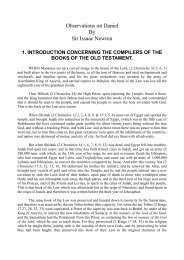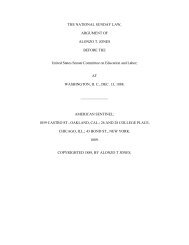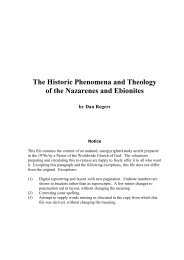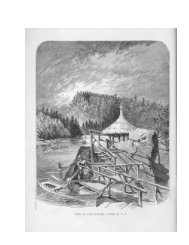THE EARLY CHRISTIAN SABBATH - Friends of the Sabbath Australia
THE EARLY CHRISTIAN SABBATH - Friends of the Sabbath Australia
THE EARLY CHRISTIAN SABBATH - Friends of the Sabbath Australia
Create successful ePaper yourself
Turn your PDF publications into a flip-book with our unique Google optimized e-Paper software.
The Early Christian <strong>Sabbath</strong><br />
First <strong>of</strong> all, <strong>the</strong>y recognized public worship on <strong>the</strong> <strong>Sabbath</strong> by providing in canon<br />
16 that – “on Saturday [<strong>the</strong> word used in <strong>the</strong> original is <strong>Sabbath</strong>], <strong>the</strong> Gospels and o<strong>the</strong>r<br />
portions <strong>of</strong> <strong>the</strong> Scripture shall be read aloud.” The Roman Catholic bishop Hefele -who<br />
records <strong>the</strong>se actions for us-and <strong>the</strong> great German church historian Neander agree that<br />
this indicates that <strong>Sabbath</strong> services were being held regularly in Christian churches at this<br />
time.<br />
Then, in canon 29, <strong>the</strong> church leaders seek to curtail <strong>Sabbath</strong> observance:<br />
“Christians shall not Judaize and be idle on Saturday [<strong>Sabbath</strong>], but shall work on<br />
that day; but <strong>the</strong> Lord's day <strong>the</strong>y shall especially, honor, and, as being Christians, shall, if<br />
possible, do no work on that day. If, however, <strong>the</strong>y are found- Judaizing, <strong>the</strong>y shall be<br />
shut out from Christ.” - Charles Joseph Hefele, A History <strong>of</strong> <strong>the</strong> Councils <strong>of</strong> <strong>the</strong> Church.<br />
Volume 2, Pages 310, 311, 316.<br />
Here is revealed <strong>the</strong> entire scheme <strong>of</strong> <strong>the</strong> fourth-century bishops. They did not<br />
dare legislate '<strong>the</strong> <strong>Sabbath</strong> out <strong>of</strong> existence; but in almost <strong>the</strong> same breath that <strong>the</strong>y<br />
provide for <strong>Sabbath</strong> worship, <strong>the</strong>y order that <strong>the</strong> seventh day shall become a workday.<br />
Then <strong>the</strong>y command that labor shall cease on <strong>the</strong> day <strong>of</strong> <strong>the</strong> sun, which <strong>the</strong>y are now<br />
calling “<strong>the</strong> Lord's day.” Note that <strong>the</strong> reason assigned is <strong>the</strong> prevention <strong>of</strong> “Judaizing.”<br />
Here is <strong>the</strong> same antagonism which had been already expressed by Justin Martyr,<br />
Origen, Tertullian, and <strong>the</strong> emperor Constantine. It now enters church law. Anti-<br />
Semitism is rampant in <strong>the</strong> ancient church. And <strong>the</strong> channel for its appearance is<br />
opposition to <strong>the</strong> <strong>Sabbath</strong> <strong>of</strong> God, <strong>the</strong> day which Christ and <strong>the</strong> apostles kept. Hatred has<br />
carried <strong>the</strong>se bishops far. It has carried <strong>the</strong>m far from <strong>the</strong> word <strong>of</strong> God and from <strong>the</strong><br />
example <strong>of</strong> <strong>the</strong> Lord Christ, whom <strong>the</strong>y pr<strong>of</strong>essed to obey.<br />
We can thus understand why Eusebius, church historian and <strong>the</strong>ologian, writing<br />
some years before Laodicea, calls <strong>the</strong> <strong>Sabbath</strong> Jewish, and boasts:<br />
“All things whatsoever that it was duty to do on <strong>the</strong> <strong>Sabbath</strong>, <strong>the</strong>se we have<br />
transferred to <strong>the</strong> Lord's day, as more appropriately belonging to it, because it has a<br />
precedence and is first in rank, and more honorable than <strong>the</strong> Jewish <strong>Sabbath</strong>.” -<br />
Commentary on Psalm 92 (Roman Catholic version, Psalm 91), in Migne, Patrologia<br />
Gracca, volume w3, column I 170. (Italics ours.)<br />
The <strong>Sabbath</strong>, <strong>the</strong>n, no longer was considered <strong>the</strong> <strong>Sabbath</strong> <strong>of</strong> God, but <strong>the</strong><br />
“Jewish” <strong>Sabbath</strong>. And who were <strong>the</strong> “we” who assumed so boldly <strong>the</strong> responsibility for<br />
this impertinent defiance <strong>of</strong> God? Certainly not <strong>the</strong> Lord Himself, or His apostles. It was<br />
<strong>the</strong> church, which had substituted its own tradition for <strong>the</strong> commandment <strong>of</strong> God. The<br />
change was accompanied by apostasy within <strong>the</strong> church, and was enforced by civil and<br />
ecclesiastical law.<br />
7. Worldliness and Paganism in <strong>the</strong> Early Church<br />
SUNDAY observance, streng<strong>the</strong>ned by an underpinning <strong>of</strong> anti-judaism, was not<br />
<strong>the</strong> only un-Scriptural practice which came early into <strong>the</strong> Christian church. There were<br />
o<strong>the</strong>r strange ceremonies and beliefs which crept in. For this <strong>the</strong>re are a number <strong>of</strong><br />
reasons. Pagans who came in as converts brought into <strong>the</strong> church <strong>the</strong>ir old pagan<br />
religious attitudes and wrong ideas. Copies <strong>of</strong> <strong>the</strong> Scriptures were scarce, and since many<br />
22

















